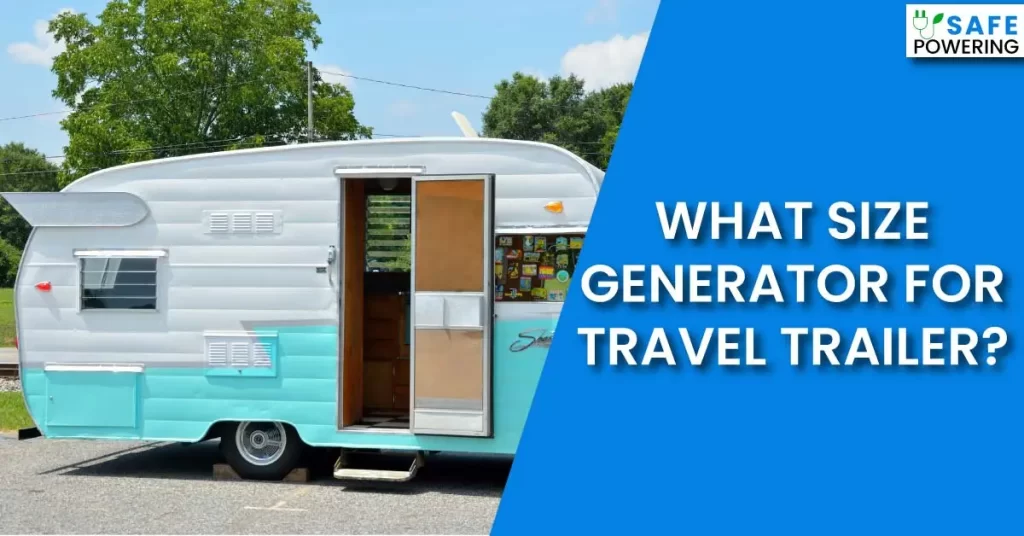What Size Generator For Travel Trailer? – TOP 5 Suggestions
If you own a travel trailer and want to know What Size Generator For Travel Trailer? Read this article to the end. We got some expert suggestions and tips for you.
Most modern RVs and travel trailers don’t come with a built-in generator. So, it almost becomes necessary to get a generator if you are a dry camping and boondocking regular.
Several factors should be considered when determining the right generator size for your travel trailer.
These include the trailer’s size, the number of appliances and electronics to be powered, and the generator’s fuel type, among others. It is also crucial to find a generator that is portable, easy to store, and affordable.

What Size Generator For Travel Trailer [Medium and Full Size]?
It’s essential to consider the total wattage of all appliances and electronics you plan to run. Generally, a generator should have at least 3,000 starting watts and 2,000 running watts to power most travel trailers. However, larger trailers may require more power, so it’s crucial to calculate your specific power needs. Additionally, consider the generator’s fuel type, portability, and affordability before making your final decision
In this article, I will provide you with comprehensive information on choosing the right generator size for your travel trailer.
We will explore the various generator types, how to calculate the power needed, and highlight some of the best models on the market.
What is An RV Generator?
An RV generator is a machine specifically for recreational vehicles (RVs). It is a compact and portable device that generates electrical power to run appliances and electronics in the RV, such as air conditioning units, refrigerators, and entertainment systems. RV generators typically run on either gasoline, diesel, or propane, and come in a variety of sizes and types.
We also got an article on the right size generator for a 50 amp RV if you own one.
Factors to be Considered for Generator for Travel Trailer
1. Power Requirements:
It’s crucial to determine the total wattage of all the appliances and electronics you plan to run to ensure that the generator you choose has enough power to run everything safely.
Consider the starting and running wattage of each item, and add them up to find the total power required. This information will help you select the right generator with enough power.
2. Fuel Type:
Different generator models use different fuel types, such as gasoline, diesel, or propane. Gasoline generators are popular because they are widely available, but diesel generators may be more fuel-efficient and provide more power.
Propane generators are quieter and more environmentally friendly. Duel-fuel generators can run on both gasoline and propane and I think those are the best because you will face fuel shortages.
3. Size and Weight:
The size and weight of the generator are important factors to consider because you need to store the generator in your travel trailer and transport it to and from the campsite.
Choose a generator that is lightweight, compact, and easy to store.
4. Noise Level:
Generators can be noisy, so it’s essential to choose one with a low noise level. Look for generators with noise-reducing features, such as soundproofing, mufflers, and low-tone exhaust systems, to minimize noise pollution at the campsite.
Anything below 65dB is a standard for camping. Anything above that is considered noisy and irritating.
5. Budget:
Generators come in a wide range of prices, so it’s essential to determine your budget before making a purchase.
Consider the features you need, the fuel type you prefer, and the wattage capacity required to run all your appliances and electronics. Look for a generator that meets your power needs and budget constraints.
6. Brand and Warranty:
Choose a reputable brand and ensure the generator comes with a manufacturer’s warranty to protect your investment.
Read reviews and ask for recommendations from other RVers to find a reliable and durable generator. A warranty can give you peace of mind in case of any defects or issues with the generator.
How Many Watts Does My Travel Trailer Generator Need?
It depends on several factors, such as the size of your travel trailer, the appliances you plan to power, and your personal power needs. However, there are some general guidelines you can follow to determine the wattage.
First, calculate the total watts of all the appliances and electronics you plan to use in your travel trailer. This includes everything from your air conditioner and refrigerator to your microwave and TV.
NOTE: Make sure to calculate the starting watts of the motor-driven appliances as well because they need an extra bit of surge power to overcome inertia to start.
Once you have a total wattage, add about 20% to that number to account for any power surges or spikes. This will give you the minimum wattage you need for your generator.
For example, if your total wattage is 3,000 watts, you would want a generator that is rated for at least 3,600 watts.
Another factor to consider is the type of generator you want to use. There are two main types of generators: Conventional and inverter.
The main difference between a conventional generator and an inverter generator is that conventional generators produce AC power that fluctuates in voltage and frequency. They can be a bit noisy and their fuel economy is average, but their power capacity can range from 2000W to 12000W.
Inverter generators produce a consistent and stable AC power output by converting DC power to AC power through a microprocessor-controlled system. They are less noisy, and their fuel economy is also good.
Common Appliance Used in a Travel Trailer
These wattage estimates are based on typical usage and may vary depending on the specific make and model of the appliance. This is just a rough estimation based on my experience.
| Appliance | Running Watts | Starting Watts |
| Air Conditioner (13,500 BTU) (Size can vary) | 1,500 – 3,500 | 3,500 – 4,500 |
| Refrigerator (AC) | 600 | 1,800 |
| Refrigerator (DC) | 50 | 120 |
| Microwave | 1,000 | 1,000 – 1,500 |
| Coffee Maker | 600 – 1,200 | 600 – 1,200 |
| Toaster | 800 – 1,500 | 800 – 1,500 |
| Hair Dryer | 1,200 – 1,800 | 1,200 – 1,800 |
| TV | 100 – 400 | 100 – 400 |
| Laptop | 50 – 75 | 50 – 75 |
| Battery Charger | 50 – 100 | 50 – 100 |
| Lights (LED) | 5 – 20 | 5 – 20 |
Will a 2000W Generator Run My Travel Trailer?
A 2000-watt generator can work for a travel trailer, but it depends on the size of the trailer and the appliances you plan to use.
To determine if a 2000W generator is sufficient for your travel trailer, you’ll need to calculate the total watts of all the appliances and electronics you are going to use either at the same time or not at the same time.
Let’s say you have a travel trailer with the following appliances:
- Air conditioner (13,500 BTU): 3,500 watts starting / 1,500 watts running
- Refrigerator (AC): 1,800 watts starting / 600 watts running
- Microwave: 1,000 watts running
- TV: 100 watts running
- Lights (LED): 20 watts running
- Battery charger: 50 watts running
The total wattage required to run all these appliances simultaneously is 6,470 watts, as we calculated earlier.
However, let’s say that you only plan on using the air conditioner and lights while camping, and will not be using the refrigerator, microwave, TV, or battery charger.
In this case, the total wattage required drops down to just 1,520 watts:
3,500 watts (air conditioner starting) + 20 watts (lights) = 3,520 watts total
A 2000-watt generator would be able to power this scenario since the maximum output of the generator is higher than the total wattage required.
Will a 3000W Generator Run My Travel Trailer?
A 3000-watt generator should be able to run most travel trailers. However, it is important to calculate the load of your travel trailer.
Here’s an example calculation based on the same appliances we used in the previous example:
- Air conditioner (13,500 BTU): 3,500 watts starting / 1,500 watts running
- Refrigerator (AC): 1,800 watts starting / 600 watts running
- Microwave: 1,000 watts running
- TV: 100 watts running
- Lights (LED): 20 watts running
- Battery charger: 50 watts running
The total wattage required to run all these appliances simultaneously is 6,470 watts, as we calculated earlier.
A 3000W generator would be able to power this scenario since the maximum output of the generator is higher than the total wattage required. In fact, it would have additional capacity to spare for other appliances or electronics, such as a coffee maker or phone charger.
What Are the Best Generators for Travel Trailers?
| Generator Model | Max Output (Watts) | Fuel Type | Run Time (at 50% Load) | Noise Level (at 25% Load) | Weight (lbs) | Price Range |
| Honda EU2200i | 2,200 | Gasoline | 8.1 hours | 48 dB | 47 | $1,000 – $1,200 |
| Yamaha EF2200iS | 2,200 | Gasoline | 10.5 hours | 57 dB | 55 | $1,000 – $1,200 |
| Champion 3100-Watt RV Generator | 3,100 | Gasoline | 8 hours | 58 dB | 95 | $800 – $900 |
| Westinghouse iGen4500DF | 4,500 | Dual Fuel (Gasoline or Propane) | 18 hours (Gasoline) or 12 hours (Propane) | 52 dB | 98 | $900 – $1,000 |
| Generac GP3600 | 3,600 | Gasoline | 13.5 hours | 69 dB | 109 | $500 – $600 |

Fareed, the highly skilled electrical expert, boasts 5 years of extensive experience in proficiently maintaining, repairing, diagnosing, and installing a diverse range of electrical systems.
